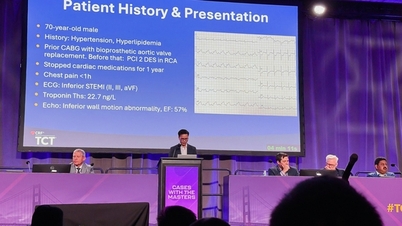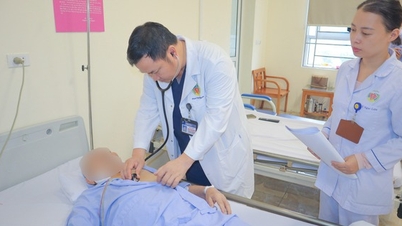Medical news September 21: Application of stem cells in disease treatment
Research, storage, application of cells and cell products is a trend of modern medicine, bringing high efficiency in health care, improving the quality of life for people.
Application of stem cells in disease treatment
At the Conference on Ensuring the quality of research on the application of cell therapy and cell-based products in Vietnam, organized by the Department of Science, Technology and Training, Ministry of Health in coordination with the Ho Chi Minh City Department of Health, delegates focused on discussing a number of contents on strengthening the quality management of research on the application of cells and cell-based products in Vietnam.
 |
| Research, storage, application of cells and cell products is a trend of modern medicine, bringing high efficiency in health care, improving the quality of life for people. |
With the spirit of innovation and synchronization in legal framework, development orientation, implementation, quality assurance, technology transfer/product commercialization, in the coming time, research and application of cells and cell products will have the right development direction, comply with legal regulations, integrate with the region and the world , bring more practical results to serve the work of caring for and protecting people's health.
Deputy Minister of Health Nguyen Tri Thuc assessed that in recent years, science and technology activities and innovation in the health sector have developed remarkably in both quantity and quality, achieving many encouraging results.
In particular, the research and development of new products, new techniques, new methods in general and research on the application of cells and cell products have initially introduced new protocols, new techniques, new products with potential, providing doctors with more options to apply to medical examination and treatment, effectively serving the work of taking care of people's health.
According to the Deputy Minister of Health, currently developed countries mainly allow research and clinical trials of these methods, especially stem cells, while their application in treatment is strictly controlled by extremely strict regulations and laws.
According to Dr. Nguyen Ngo Quang, Director of the Department of Science, Technology and Training, the Ministry of Health has consulted practical applications from regions and countries, and incorporated them into legal content with the aim of creating conditions for the development of new medical research, new techniques, and new technologies to serve people's health care, especially in the fields of biotechnology and regenerative medicine. In particular, cell therapy and cell products are areas that the Ministry of Health focuses on.
According to Dr. Quang, all countries have strict regulations on cell research and application; there is a classification of risks related to cell research and cell application; development into drugs and commercial products. Classification is based on risk: whether the cells are from autologous or allogeneic sources.
When evaluating the application for permission to conduct clinical trials, human trials are also based on risk classification such as low, medium and high. From the risk classification, it is mandatory to go through the Biomedical Research Ethics Council; after being classified, stem cells and stem cell products and stem cell products are extremely important.
This person cited that countries like Japan, the US, or Europe all consider cell therapy as a risk to humans and all classify the risk levels of cell therapy. The management agencies all stipulate that this is a new method, a new technique, and needs to be reviewed and evaluated by the Biomedical Research Ethics Council to make research requirements...
Dr. Tham Thi Thu Nga, Director of Tam Anh Stem Cell Center, said that the application of hematopoietic stem cells has been used in many techniques, in many countries around the world and right in Vietnam.
The Stem Cell Center also coordinates with clinical units to deploy new techniques, applying cell-based therapy to treat patients.
Dr. Nga emphasized that Tam Anh General Hospital System focuses on promoting clinical trials using mesenchymal stem cells in the treatment of osteoarthritis. This trial strictly complies with the regulations of the Ministry of Health and the National Ethics Council to ensure the benefits of patients as well as the reliability of the research.
Currently, the Stem Cell Center, Tam Anh General Hospital System is implementing the licensed service of storing umbilical cord blood stem cells and umbilical cord tissue; in collaboration with Tamri Research Institute, researching the application of mesenchymal stem cells from umbilical cord tissue in the treatment of osteoarthritis; combined with platelet-rich plasma in the treatment of rheumatoid arthritis, osteoarthritis, etc. These studies initially show positive treatment results, safety, good pain relief, good mobility, bringing satisfaction to patients.
Still concerned about this service, Deputy Director of the Ho Chi Minh City Department of Health Nguyen Anh Dung said that common violations in the field of stem cells are providing medical examination and treatment services without a license to operate medical examination and treatment; medical examination and treatment without a practice certificate; advertising medical examination and treatment services without a license or certificate to practice medical examination and treatment; advertising false information, exceeding the scope of expertise, without a certificate confirming the advertising content.
Advertising stem cells as a cure for all diseases, but not from licensed medical facilities; not licensed by the Department of Health.
Mr. Dung emphasized the need to do well in detecting and handling violations to protect facilities that deploy licensed stem cell therapies that are truly effective in application; at the same time, it is necessary to continue tightening appraisal and licensing activities related to stem cell treatment; and strengthen inspection and supervision.
According to the leader of the Ho Chi Minh City Department of Health, it is not a matter of whether the regulations are more or less difficult, but rather there needs to be clarity on legal regulations for licensing, management and handling of violations, creating conditions for those in need to access quality, truly effective cell therapy services and therapies.
The danger of drug resistance to human health
The World Health Organization has declared antimicrobial resistance as one of the top 10 global public health threats facing humanity. The misuse and overuse of drugs is a major cause of the development of antimicrobial-resistant microorganisms.
The World Health Organization has declared antimicrobial resistance as one of the top 10 global public health threats facing humanity. The misuse and overuse of drugs is a major cause of the development of antimicrobial-resistant microorganisms.
In Vietnam, the Prime Minister approved the National Strategy for Antimicrobial Resistance Prevention and Control for the 2023-2030 period, with a vision to 2045, in Decision No. 1211/QD-TTg dated September 25, 2023. The Strategy is the foundation for implementing solutions and actions to achieve the goal of reducing antimicrobial resistance.
Director of the Department of Medical Examination and Treatment Management Ha Anh Duc said that the Ministry of Health has been coordinating with domestic and international agencies, organizations and partners to implement many actions on preventing and combating antibiotic resistance such as communication and raising public awareness about the causes and consequences of antibiotic resistance;
At the same time, train and improve the professional qualifications of doctors and pharmacists in diagnosing, treating, prescribing antibiotics appropriately and responsibly; establish and strengthen the National Antibiotic Resistance Surveillance System; develop and implement a program to manage antibiotic use in hospitals; monitor hospital infections; develop legal documents and professional guidelines on treatment, microbiology, clinical pharmacy, infection control, etc.
However, according to Dr. Ha Anh Duc, antibiotic resistance is still increasing and is a major challenge for the health sector. It requires increased efforts in the long-term fight of the Government, agencies, relevant units and people against this issue.
According to the World Health Organization (WHO) 2014 Global Report on Antimicrobial Resistance, compiled from 114 countries across regions, patients are staying in hospital longer and mortality rates are increasing across all age groups.
In Europe, the number of hospital days increased by 2.5 million days, the death rate increased by 25,000 people/year; in Thailand, the number of hospital days increased by more than 3.2 million days and the death rate increased by 38,000 people/year; in the US, about 2 million people contracted infectious diseases and 23,000 people died/year. This has a great impact on the economy and society in countries around the world, especially poor and underdeveloped countries.
Warning of cardiovascular disease in young people
Professor Pham Manh Hung, Director of the Vietnam Heart Institute, Bach Mai Hospital, cardiovascular diseases that used to be found in the elderly now attack even the very young and are a major medical burden. Among them, myocardial infarction is a dangerous disease, with a mortality rate of over 70%.
The disease can occur suddenly while sleeping, playing or working and tends to get younger. Most cases of sudden death in young people are due to myocardial infarction, in the group of men who smoke, are obese or have family factors.
At the Vietnam Heart Institute alone, each year, out of 3,500-4,000 cases of cardiovascular intervention, 15%-17% are patients under 40 years old.
There are people 25-30 years old who have myocardial infarction, need intervention. In the community, the rate of young people 30-40 years old with high blood pressure is very high. Most cases of sudden death in young people are due to myocardial infarction, most of them are in the group of men who smoke, are obese or have family factors.
Explaining the reason why cardiovascular disease is increasingly common in young people, cardiovascular experts say that there are many factors in life that have been proven to increase the likelihood of the appearance and progression of cardiovascular disease.
In addition to lifestyle risk factors (such as smoking, tobacco, lack of exercise, obesity, blood pressure, diabetes), new risk factors have been discovered. These are risks such as environmental pollution, stress, staying up late...
"For young people, many patients have risk factors that accumulate earlier. The main causes of the disease are eating fast food, greasy food, stressful work, more environmental pollution and lack of exercise," said Professor Hung.
It is worth mentioning that half of patients with heart failure will die after 5 years. This is truly an alarming number. "While people are very scared when hearing about cancer, the mortality rate due to heart failure is higher than that of common cancers such as breast cancer or colorectal cancer.
According to doctors, young people should not subjectively think that myocardial infarction only occurs in the elderly and ignore the signs of the disease, which can easily lead to serious complications later.
It is important to pay attention to regular health check-ups as well as to see a cardiologist when there are unusual symptoms to detect and treat early, helping to prevent myocardial infarction and complications. When the patient shows signs such as chest pain, shortness of breath, cold sweats, vomiting, dizziness, etc., they should go to a medical facility with a cardiology department for timely diagnosis and intervention to treat myocardial infarction.
Associate Professor, Dr. Nguyen Thi Lam, former Deputy Director of the National Institute of Nutrition, added that disease prevention should start from a young age, even when they are still children. Because obese children can experience dangerous cardiovascular complications such as high blood pressure, thickened heart muscle, lipid disorders, etc.
Daily diet needs to increase consumption of fruits and vegetables to provide more vitamins, minerals and fiber... These are all good nutrients that help prevent disease.
For people with high blood pressure, a diet rich in fruits, vegetables and whole grains is especially recommended. In addition, daily meat consumption should be limited.
If possible, plan to eat 2-3 meatless meals per week and limit red meat intake to no more than 1 meal per week; avoid eating fat and animal organs. It is especially necessary to give up smoking, not abuse alcohol, exercise regularly, maintain a reasonable weight, and treat any medical conditions such as high blood pressure, diabetes, and dyslipidemia.
According to statistics, every year in our country, about 200,000 people die from cardiovascular diseases, accounting for 33% of all deaths. Among cardiovascular diseases, coronary artery and stroke are the most common causes of death or disability.
To reduce the risk of cardiovascular diseases, especially coronary artery occlusion and myocardial infarction, experts recommend that people need to have a reasonable diet, limit eating fat, animal skin, liver, fast food, beer, alcohol, stimulants and should increase exercise.
Source: https://baodautu.vn/tin-moi-y-te-ngay-219-ung-dung-te-bao-goc-trong-dieu-tri-benh-d225508.html










































































































Comment (0)